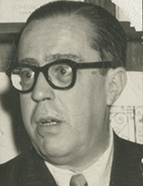

Sérgio Buarque de Holanda is one of the most renowned interpreters of the formation of Brazilian society. His works, published in books, articles, and prefaces, continue to spark debates among sociologists, political scientists, ethnologists, literary critics, and historians from various specialisations and theoretical traditions. Alongside Caio Prado Jr. and Gilberto Freyre, he is considered one of the founding figures of Brazilian historical sociology, al though such classifications often fail to fully capture his contributions to Brazilian historiography and the intellectual and cultural history of Luso-Brazilian society in particular.
The historian was born on July 11, 1902, in the traditional Liberdade neighbourhood of São Paulo, into a modest middle-class family. His father was an employee in the state Sanitation Service and a professor of botany at the School of Pharmacy and Dentistry, and was also one of its founders. During his childhood, Holanda attended the Escola Modelo Caetano de Campos , and during his teenage years, the Ginásio de São Bento . At the Benedictine school, he was a student of historian Affonso d'Escragnolle Taunay (1876–1958) and frequently visited the Public Library of São Paulo, where he discovered the works of Portuguese chroniclers and became familiar with Portuguese historiography from the medieval and early modern periods. At the age of 18, he published his first chronicle, Originalidade Literária [Literary Originality] in the Correio Paulistano (24 April 1920), in which he debated the existence of an authentically national literature—an issue that had captivated the minds of writers and historians since the late 19th century.
From 1921, Sérgio lived in Rio de Janeiro, then the federal capital of Brazil, graduating in Law and Social Sciences from the Faculty of Law of Rio de Janeiro in 1925. However, he chose not to pursue a legal career, instead working as a journalist, translator, and literary critic until the mid-1950s. He was an early member of the Modernist movement, serving as the Rio de Janeiro correspondent for the Revista Klaxon , a journal founded by the Modernist group in São Paulo, led by figures such as Mário de Andrade, Oswald de Andrade, Rubens Borba de Moraes, Alcântara Machado, Sérgio Milliet, Manuel Bandeira, Raul Bopp, and Tácito de Almeida.
This work is financed by national funds through FCT - Foundation for Science and Technology, I.P, in the scope of the projects UIDB/04311/2020 and UIDP/04311/2020.
